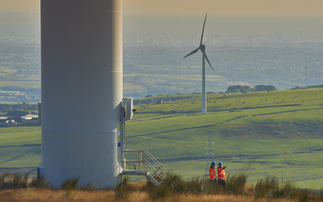
Partner Content: For financially constrained local authorities, deciding where to invest public money to achieve net zero carbon targets is increasingly complex. With so many future energy possibilities, where should you focus your attention - and why should hydrogen be part of your decarbonisation plan? Chris O'Connor, head of hydrogen at Equans UK & Ireland explains
Making the case for decarbonisation
National targets for achieving net zero carbon emissions by 2050 mean that local authorities are under pressure to decarbonise their own operations and introduce carbon-reduction initiatives across their regions.
But decarbonisation is one of many urgent challenges that local government needs to address, at a time of budget constraints and cost of living pressures. The number-one priority for local government must be to improve the lives of people who live, work and play in their area. If local government decisions must be evaluated according to the societal benefits they deliver, how does decarbonisation stack up?
There is strong evidence that decarbonisation and tackling the climate emergency are major concerns for people in Britain. More than 80 per cent of the public say they are concerned about climate change and more than 30 per cent think it is one of the top three issues facing the UK. The reality is that decarbonisation brings economic and social benefits, as well as the obvious environmental improvements. Investing in decarbonisation means investing in the future and establishing a region where people want to live and where businesses want to invest.
Local authority decision-makers are faced with a bewildering array of potential options to achieve decarbonisation, so it's important to understand which are the most effective and which could help to spark a wider adoption of low-carbon technologies across the region.
Understanding the role of hydrogen
Hydrogen is attracting much attention for its decarbonisation potential because it is a clean alternative to natural gas and petroleum. It does not release carbon dioxide (CO2) when it is combusted and as such the UK Climate Change Committee predicts that hydrogen will meet 20 per cent to 35 per cent of the UK's final energy demand by 2050.
On earth, hydrogen is found in huge volumes in water (H2O) and hydrocarbons (e.g. methane - CH4). Hydrogen gas can be extracted via several methods, the most common of which is steam methane reformation. This currently accounts for most of the world's hydrogen production, but it does produce carbon as a by-product - meaning that carbon capture and storage is required to make this a low carbon process.
An alternative is to produce hydrogen using electricity to power an electrolyser that splits the hydrogen from water molecules. This process produces pure hydrogen, with no harmful by-products. As long as renewable electricity is used to power the electrolysis, this is an entirely carbon-free process. As a chemical store of energy, hydrogen has strong potential for long-duration energy storage, complementing renewable energy in decarbonising the power sector and enhancing energy security.
Applications for hydrogen
Alongside this systemic use of hydrogen, there are several potential consumer applications for hydrogen, some of which are relatively easy to implement, while others require considerable investment in enabling infrastructure.
Low or zero carbon hydrogen can be used to replace current polluting hydrogen as an industrial chemical feedstock. This is a straightforward process since it is a like-for-like switch, and there are no alternative decarbonisation options.
The reaction between hydrogen and oxygen is exothermic, meaning it can be used as a direct source of heat in high-temperature industrial processes, such as steelmaking and glass making, as well as in vehicle production, distilling and food and drink manufacturing.
Hydrogen can also be used as a fuel for transportation. It is most viable as an option for heavy vehicles, such as 44 tonne HGVs, or long-distance bus and coach services. In the longer term, hydrogen - or hydrogen-derived fuels - are likely to play a key role decarbonising aviation and shipping.
Deciding where to invest
Faced with all these possibilities, local authorities need to determine the potential demand for hydrogen within their region - whether for transport, manufacturing or industrial processes - and how it can best be sourced, supplied and delivered to meet that demand.
Hydrogen is in its infancy in the UK, and the whole supply chain and supporting infrastructure needs to scale up significantly to meet projected future demand. Local government has an important role in initiating a local hydrogen economy by taking the lead in hydrogen adoption and providing supportive policy to attract investment into infrastructure.
When it comes to sourcing hydrogen, there are a number of large-scale national and global hydrogen production projects underway, but the infrastructure to deliver hydrogen locally, whether by pipeline or tube trailer, is limited. Instead, local governments can take the lead by encouraging the development of decentralised, small-scale electrolytic hydrogen generation facilities within their regions, close to areas of likely demand - such as industrial estates.
Developing a hydrogen strategy
The first step for local authorities is to understand potential demand for hydrogen within their regions, today and into the future. This is where Equans can help. Our purpose is to help customers navigate energy, digital and industrial transitions. We can apply our expertise to identify opportunities, assess demand and recommend solutions for hydrogen production and delivery. We have developed a technique to analyse the current energy consumption at a local or regional level and forecast the future local hydrogen demand across different sectors.
As part of the Net Zero North West Cluster Plan project, we identified the role of green hydrogen in delivering the UK's first net zero industrial cluster. We published an electrolytic hydrogen recommendations report, which summarised how hydrogen production facilities across the region could be optimised for the lowest overall cost to meet regional hydrogen demand.
Green Hydrogen Vision for Liverpool City Region
We recently completed a project for Liverpool City Region Combined Authority (LCRCA) to develop a Green Hydrogen Vision for the six local authorities in the area. As a forward-thinking authority, LCRCA has set a net zero target of 2040, ten years ahead of the national target. The combined authorities know that they need to lead by example by first decarbonising their own operations, to create momentum for the private sector to follow suit.
LCRCA's own decarbonisation pathway forecasts that hydrogen will meet more than 20 per cent of net zero demand by 2040, primarily supporting energy-intensive foundation industries and logistics operations. However, the authority required a strategy that would provide more detail about where this demand would come from and when it would emerge, so that the local authorities could begin to plan and invest appropriately.
Identifying potential demand
Our specialists began by assessing current fossil fuel demand from those sectors that might require hydrogen by 2030. We analysed a vast amount of data to enable us to attribute current fossil fuel consumption to individual locations, such as bus and HGV depots, industrial sites, and across the road network. We consulted with stakeholders to determine the route to decarbonisation for each sector, whether through energy efficiency, electrification, or fuel switching. Together, this work enabled us to forecast and map potential hydrogen demand by 2030.
We identified clusters of demand around industrial or business parks, which made these attractive locations to develop hydrogen production and distribution projects. We identified 21 of these locations as potential "hydrogen hubs". For each hub, we forecasted the likely hydrogen demand and the electrolyser capacity required to generate sufficient green hydrogen for that location. In total, we calculated that the 21 hydrogen hubs could account for more than 1TWh of hydrogen demand by 2030 - saving more than 225,000 tons of CO2 each year.
Turning vision into reality
A key part of developing hydrogen as a viable decarbonisation option is raising awareness and educating decision-makers about the risks, opportunities, and implications it presents. As part of our work with LCRCA, we delivered valuable educational sessions with the local authorities across the region, empowering them to make well-informed decisions about hydrogen investments in the years ahead, and to promote its wider adoption.
Furthermore, as a leading engineering, procurement construction (EPC) contractor Equans has all the necessary skills to take hydrogen projects from vision to reality. We can design, build, operate and maintain hydrogen production facilities and have delivered many projects across Western Europe, so the LCR Green Hydrogen Vision was produced with constructability in mind.
Mark Knowles, energy and industry lead for LCRCA said: "It has become increasingly clear that hydrogen will play a critical role in enabling our region to achieve its net zero targets. Our new Green Hydrogen Vision offers greater clarity for us and our stakeholders on the opportunities and challenges we face to deliver a vibrant hydrogen economy.
"Working with the Equans team and local partners we have been able to map, analyse and cluster in detail where our priorities are to effectively deploy hydrogen technologies to support our industrial and transport sectors in their net zero transition. Liverpool City Region wants to be in the vanguard of the emerging hydrogen economy, both for decarbonisation benefits but also to gain first-mover advantage in a new set of clean technologies that have significant potential to create jobs and economic benefit for our area.
"We are a recognised centre for offshore wind generation and have exciting plans for industrial-scale tidal power generation in the River Mersey. Electrolytic hydrogen production at scale is a complementary technology to wind, tidal and solar. There is a compelling economic advantage for an area that has industrial volumes of clean power and hydrogen. The City Region has a proud history in the hydrogen sector and the work that Equans has completed offers us a roadmap to an exciting future."
Integrated net zero energy solutions
Decentralised hydrogen infrastructure can play a key role in enabling local authorities to meet net zero targets and attract investment into their regions.
Any new hydrogen infrastructure needs to be planned as part of an integrated energy solution for achieving net zero in each region. Assessing future demand for hydrogen and determining the necessary infrastructure to produce and deliver hydrogen is a complex undertaking. Local authorities need to consider hydrogen options alongside multiple other decarbonisation possibilities, within the financial constraints they face. At Equans, we help local authorities cut through the uncertainty to identify and deliver the most practical and appropriate hydrogen solutions as part of fully integrated net zero strategies.
Chris O'Connor is head of hydrogen at Equans UK & Ireland
Find out more about our hydrogen capabilities at: https://www.equans.co.uk/hydrogen
This article is sponsored by Equans UK & Ireland.








